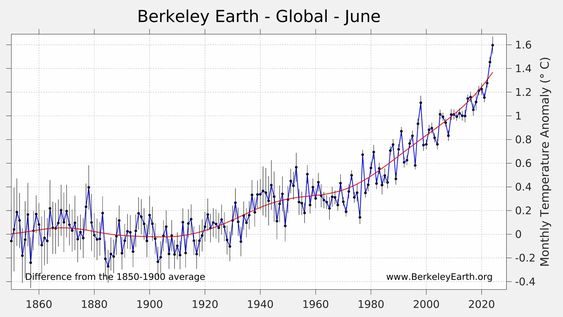
The following is a summary of global temperature conditions in Berkeley Earth’s analysis of June 2024.
- Globally, June 2024 was the warmest June since records began in 1850.
- The previous record for warmest June, set in 2023, was broken by a relatively large margin (0.14 °C / 0.25 °F).
- The ocean-average and land-average each also set new records for the warmest June.
- Warm conditions occurred particularly in South America, parts of Asia, Africa, and large areas of the Atlantic Ocean.
- Parts of Antarctica exhibited unusually cold monthly averages in June.
- We estimate that 63 countries set new national monthly average records for June.
- The El Niño that began last year has now ended. La Niña is expected later this year.
- The 12-month moving average sets a new record at 1.68 ± 0.07 °C (3.02 ± 0.13 °F) above the 1850-1900 average.
- 2024 is likely to be the warmest year on record.
2024 has been dangerously hot. According to the WHO, heat stress is now the world’s leading cause of weather-related deaths. They estimate 500,000 heat-related deaths annually, with 45% in #Asia & 36% in #Europe. This new #Climate is delivering a #human and #ecological crisis. pic.twitter.com/yrFmdQKVPw
— Peter Dynes (@PGDynes) July 18, 2024
The global mean temperature in June 2024 was 1.60 ± 0.09 °C (2.87 ± 0.17 °F) above the 1850 to 1900 average. This is similar to other recent months, though less warm than last September’s peak.
This is the thirteenth consecutive month to set a new monthly record, often by large margins. In addition, June 2024 marks the twelfth consecutive month at least 1.5 °C warmer than the monthly average for 1850 to 1900.
One of the Paris Agreement’s ambitions has been to limit global warming to no more than 1.5 °C (2.7 °F) above the preindustrial baseline. That goal is defined in reference to the average climate over many years, so a few individual months or a single year above 1.5 °C does not automatically mean that the target has been exceeded. However, recent anomalies above 1.5 °C indicate that the Earth is near that limit. Global warming will likely cause the long-term average to exceed 1.5 °C during the early 2030s unless significant reductions in greenhouse gas emissions are achieved soon.
After 13 consecutive months of record-high monthly averages, the 12-month moving average of global mean temperature now stands at 1.68 ± 0.07 °C (3.02 ± 0.13 °F) above the 1850-1900 average. We are likely at or near the peak for this warming event, as relative cooling is expected soon with the end of El Niño. Compared to the long-term trend, the current deviation is one of the largest on record. Other recent significant El Niño events, such as 2016 and 1998, produced somewhat smaller deviations above the trend. Only the 1878/88 Super El Niño presented a more significant deviation above the trend line than the current event.




1 Comment
Pingback: Sunday, July 21. was the hottest day ever recorded globally #Copernicus - Bergensia